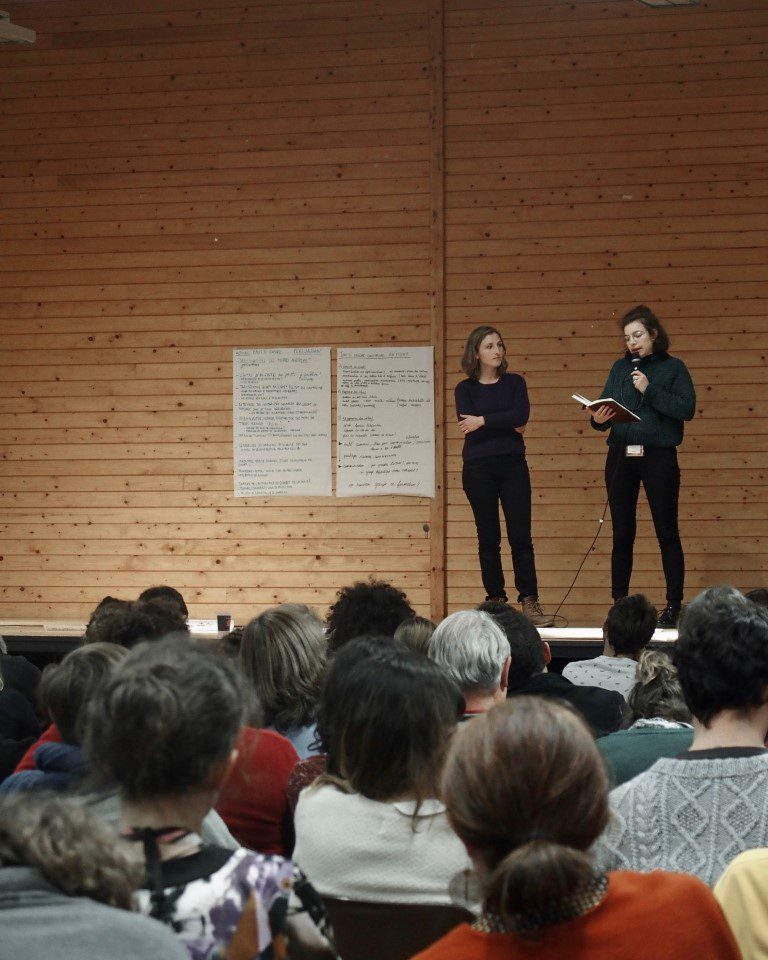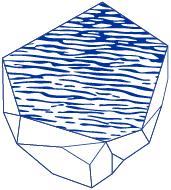Les 30, 31 novembre et le 01 décembre 2019 s’est tenue en Bretagne la 2ème
Rencontre pour une Frugalité Heureuse et Créative.
Nées suite à la rédaction d’un manifeste, cette initiative annuelle réunit celles et ceux qui souhaitent s’engager pour une vie et une pratique durable des métiers de la construction face à l’effondrement de la biodiversité et les crises climatiques de l’anthropocène.

Si l’initiative vous parle et que vous souhaitez en savoir davantage…

Comme vous pouvez l’imaginer, avec Lost&Find l’initiative nous a parlé… Nous nous y sommes rendues pleines de curiosité et d’enthousiasme, Lauriane, Jade, Perrine et Valentine, pour trois jours de visites, de rencontres, de débats animés et, comme promis, de festivités. Trois communes se sont partagé l’accueil de l’événement et des participant.e.s : Guipel, Hédé-Bazouges et Langouët.

Ainsi, architectes, étudiants et autres curieux.ses ont donc pu les visiter accompagné.e.s des élu.e.s et découvrir comment, à leur manière et à leur échelle, ils pratiquaient la ville durablement. Allant de la construction de maisons écologiques innovantes – dont la pertinence fut nuancée après quelques années d’utilisation -, à la gestion des déchets à la pesée, en passant par des cantines bio et locales, pour finir sur des poules en liberté comme ralentisseurs de voitures nous parmi les nombreuses découvertes de ces communes étonnantes.
S’en est suivi une succession de discussions. Tout d’abord un état des lieux des différents représentants régionaux du mouvement et de leurs actions et interactions depuis la dernière rencontre. Puis un moment collectif de réflexions organisées sous forme de pôles autour d’une grande question: “Faut-il encore construire ?”. Chaque pôle sous traitant cette question: en zone péri-urbaine ? En ville ? Sur les territoires ruraux ? Dans les bourgs ? Et enfin, sur le littoral ? L’objectif de chaque groupe d’une trentaine de personnes était d’extraire de ces discussions plusieurs propositions, mesures, et engagements, à soumettre aux participant.e.s.
L’ensemble des propositions furent à nouveau placées dans 4 catégories d’ambitions et écrites sur de grandes affiches:
1/ Préserver le sol comme une ressource précieuse,
2/ Anticiper sur les évolutions climatiques,
3/ Raconter le territoire,
4/ Réparer le territoire.

L’ensemble des mesures sont à retrouver sur le compte rendu de la Frugalité Heureuse, ici:
2ème rencontre de la frugalité heureuse et créative [télécharger PDF]

Et enfin chaque participant à l’aide de 5 gommettes a pu voter directement sur les affiches pour celles qui lui semblaient prioritaires. “Quatorze engagements pour un urbanisme frugal” à développer et argumenter pour les communiquer à un maximum de communes en France (et ailleurs..), furent donc votés par l’ensemble des participant.e.s.
Dans ces engagements on retrouve des mesures telles que: Privilégier la transformation du bâti existant avant d’envisager toute construction neuve.
/ Sanctuariser les bonnes terres agricoles, les secteurs de biodiversité et les zones de captage hydraulique.
/ Œuvrer pour renforcer l’implication citoyenne vers un projet partagé.

De notre côté, le fait de se rassembler brièvement dans un contexte convivial et festif nous a permis d’échanger facilement avec des professionnels et acteurs du territoire de toutes les origines et générations. Cette configuration, allant jusqu’à créer un fort sentiment d’unité et de communauté qui nous est cher, a largement contribué à croiser les regards et expériences des participants pour des échanges fructueux sur ces sujets pourtant complexes et préoccupants. La question centrale “Faut-il encore construire ?” a, selon nous, manqué d’ampleur dans les réponses apportées notamment car elle n’a pas été traitée de manière radicale, mais plutôt en cherchant à tempérer l’acte de construire. N’étant pas forcément donnée aux jeunes en nombre assez réduit, il ressort de la discussion générale un manque de diversité dans les avis et ressentis collectés. Il semble notamment plus facile pour la jeune génération d’envisager de ne pas commencer à construire que pour l’ancienne d’arrêter.
Cependant, le niveau d’engagement que la signature d’un tel manifeste implique fut aussi rappelé: ses constats clairs et alarmants mettant profondément en question les implications du métier de bâtisseur, doivent influencer la pratique de chacun.
Un bel exemple d’engagement pro-actif fut donné par l’agence Studiolada à Nancy qui a proposé la création d’une “carte des ressources” disponible en circuit court dans l’Est de la France.

N’hésitez pas à la consulter, l’utiliser et l’enrichir de nouveaux gisements de matières locales & responsables !





